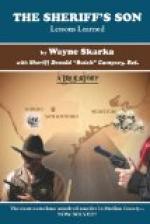The bunkhouse loomed before him in the darkness. As he plunged at the door a shot rang out. A bolt of fire burned into his shoulder. He flung the door open, slammed it shut behind him, locked and bolted it almost with one motion. For a moment he leaned half swooning against the jamb, sick through and through at the peril he had just escaped.
But had he escaped it? Would they not break in on him and drag him out to death? The acuteness of his fright drove away the faintness. He dragged the bed from its place and pushed it against the door. Upon it he piled the table, the washstand, the chairs. Feverishly he worked to barricade the entrance against his enemies.
When he had finished, his heart was beating against his ribs like that of a wild rabbit in the hands of a boy. He looked around for the safest place to hide. From the floor he stripped a Navajo rug and pulled up the trapdoor that led to a small cellar stairway. Down into this cave he went, letting the door fall shut after him.
In that dark blackness he waited, a crumpled, trembling wretch, for whatever fate might have in store for him.
How long he crouched there Beaudry never knew. At last reason asserted itself and fought back the panic. To stay where he was would be to invite destruction. His attackers would come to the window. The barricaded door, the displaced rug, the trapdoor, would advertise his terror. The outlaws would break in and make an end of him.
Roy could hardly drag his feet up the stairs, so near was he to physical collapse. He listened. No sound reached him. Slowly he pushed up the trapdoor. Nobody was in the room. He crept up, lowered the door, and replaced the carpet. With his eyes on the window he put back the furniture where it belonged. Then, revolver in hand, he sat in one corner of the room and tried to decide what he must do.
Down in the cellar he had been vaguely aware of a dull pain in his shoulder and a wet, soggy shirt above the place. But the tenseness of his anxiety had pushed this into the background of his thoughts. Now again the throbbing ache intruded itself. The fingers of his left hand searched under his waistcoat, explored a spot that was tender and soppy, and came forth moist.
He knew he had been shot, but this gave him very little concern. He had no time to worry about his actual ills, since his whole mind was given to the fear of those that were impending.
Upon the window there came a faint tapping. The hand with the revolver jerked up automatically. Every muscle of Beaudry’s body grew rigid. His senses were keyed to a tense alertness. He moistened his lips with his tongue as he crouched in readiness for the attack about to break.
Again the tapping, and this time with it a quick, low, imperious call.
“Mr. Street. Are you there? Let me in!”
He knew that voice—would have known it among a thousand. In another moment he had raised the window softly and Beulah Rutherford was climbing in.




